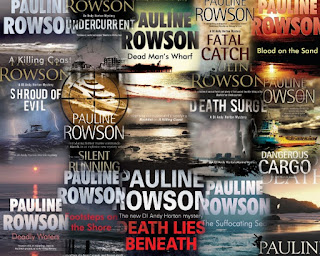Checklist for writing a good crime story, writing tips and National Crime Writing Month 2012
I've got a new page on my official website entitled 'Writing Tips'. At the moment it comprises of a checklist for writing a good crime story, but this might be added to in due course. There are also interviews and further tips on the blog on my website.
I drafted this checklist to help those entering the CWA's ( Crime Writers' Association) Young Crime Writers' Competition 2011 so it is angled slightly towards writing a short story rather than a crime novel. Sadly the Young Crime Writers' Competition is not continuing for 2012, which is a shame because I felt it was just gaining momentum.
However there is going to be a National Crime Writing Month in June 2012 with lots of author and writing events taking place across the UK. I'll post more details here and on my website in due course but you can check this out and other events by visiting the CWA website
How to write a good crime story by Pauline Rowson
There are many different types of crime stories and many different types of crime novels from gritty gruesome, cosy comfortable to cops, robbers and gangsters, racy, action-packed thrillers, historical or contemporary, detective or private eye…
Then there is the setting: the city, the sea, countryside, mountains, home or abroad, and the theme – what message are you trying to get across? And whose story is it anyway?
So -
Choose your location
Choose your type of crime story
Think about a good theme or message you want to get across in your story
Choose who is going to be your main character or characters
Checklist for a good crime story
I drafted this checklist to help those entering the CWA's ( Crime Writers' Association) Young Crime Writers' Competition 2011 so it is angled slightly towards writing a short story rather than a crime novel. Sadly the Young Crime Writers' Competition is not continuing for 2012, which is a shame because I felt it was just gaining momentum.
However there is going to be a National Crime Writing Month in June 2012 with lots of author and writing events taking place across the UK. I'll post more details here and on my website in due course but you can check this out and other events by visiting the CWA website
How to write a good crime story by Pauline Rowson
There are many different types of crime stories and many different types of crime novels from gritty gruesome, cosy comfortable to cops, robbers and gangsters, racy, action-packed thrillers, historical or contemporary, detective or private eye…
Then there is the setting: the city, the sea, countryside, mountains, home or abroad, and the theme – what message are you trying to get across? And whose story is it anyway?
So -
Choose your location
Choose your type of crime story
Think about a good theme or message you want to get across in your story
Choose who is going to be your main character or characters
Checklist for a good crime story
- It should be well written with a truly surprising ending.
- You need to plant clues throughout the crime story – not too many but just enough to get the reader thinking.
- One critical piece of information is usually held back until just before the ending.
- The best stories are those that have a theme/message and are firmly based on character.
- Beginning: the main character is introduced immediately, so is the tone and setting and the problem
- Middle: Build the motivation and tension.
- The climax – this is the worst possible moment of the story.
- The ending
- If you are writing a short story then there should be unities of time, place and action which means that the story should take place over a very short space of time, in the same place and ideally through the main character’s eyes. This results in tight construction and a successful short story.

Comments